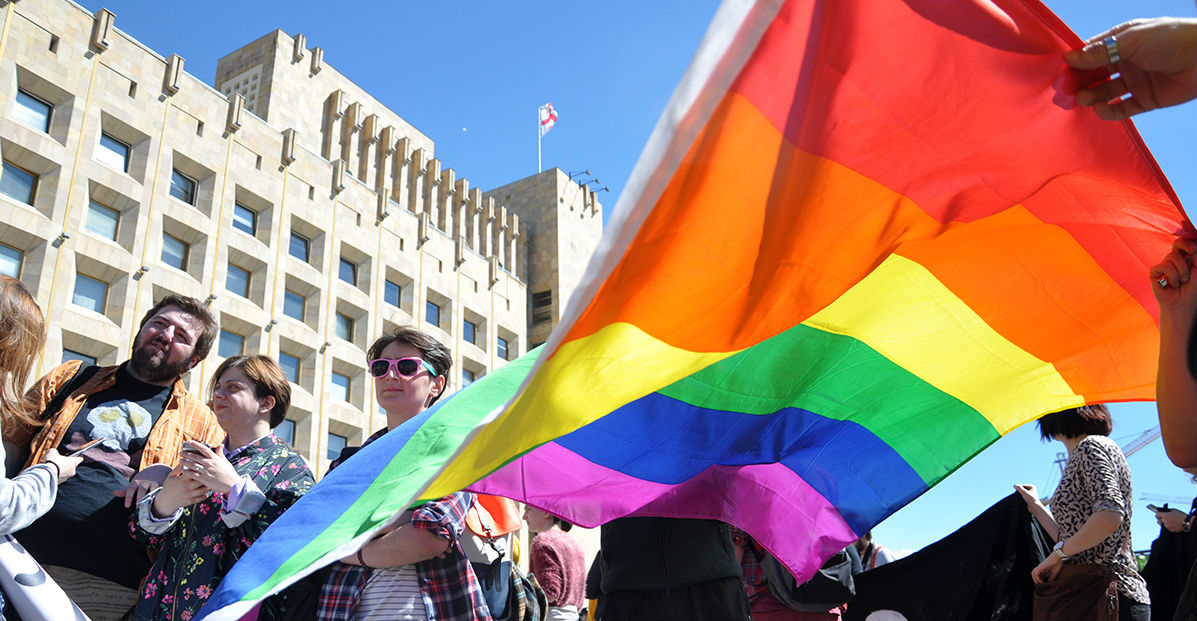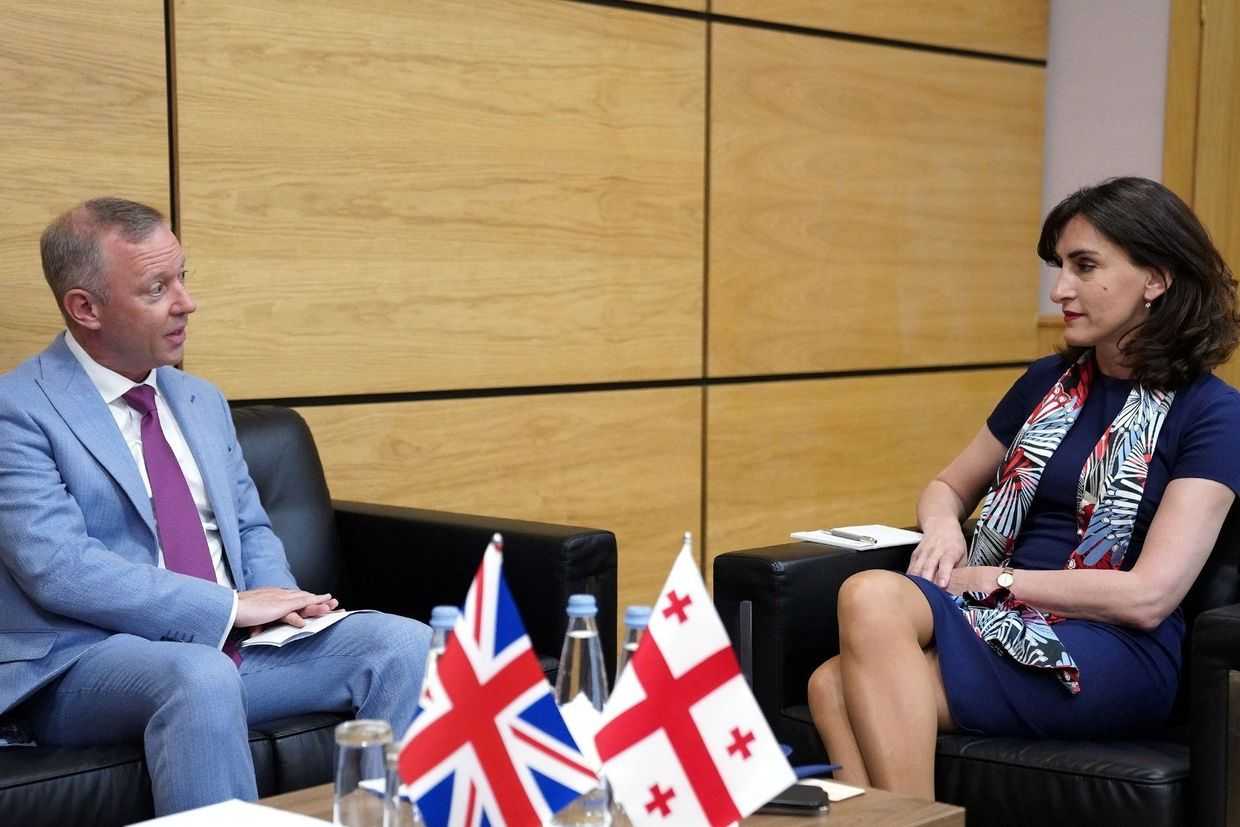

An advertising company that owns public ad spaces in central Tbilisi has refused to display anti-homophobia messages despite signing a contract with Georgian queer rights group the Equality Movement to do so, according to the group.
The Equality Movement had intended to display messages promoting equality on Tbilisi’s streets for 17 May — International Day Against Homophobia, Transphobia, and Biphobia (IDAHOT). The group accused advertising company Alma of refusing to provide them with the service on ‘discriminatory grounds’.
‘Our lives are in danger. Because the government won’t ensure our safety, we are forced to refuse our constitutional rights to gather. With this poster, we are trying to make our voices heard: 17 May is the International Day Against Homophobia and Transphobia. Rethink what happened on 17 May’, one of the posters read.
International Day Against Homophobia is observed annually on 17 May in more than 120 countries. The date was chosen to commemorate the World Health Organisation’s decision in 1990 to remove homosexuality from the International Classification of Diseases.

According to a statement published by the Equality Movement on Tuesday, the organisation signed an agreement with Alma on 24 April. According to the contract, it was agreed that the visuals of the posters would be agreed later. They said they had met with the company and informed them that their posters would feature messages about 17 May and equality.
‘The company said the reason behind their refusal was the risk of vandalism that anti-homophobic and pro-equality banners may pose, and that it may endanger the safety of passengers at bus stops’, they said.
However, according to the Equality Movement, their contract had a provision that stated the Equality Movement would cover all costs of reprinting and installing damaged posters.
In their statement, they said they had been deprived of the ‘most efficient way to make their voices heard’ given that the company owns all advertising spaces in the city centre.
They said they planned to take the company to court over their refusal and to ‘use every legal mechanism to ensure justice’.
A spokesperson for Alma told OC Media they were not aware of the statement by the Equality Movement and could not yet comment on the allegations.
Georgia adopted controversial anti-discrimination legislation in 2014 as part of its Visa Liberalisation Action Plan with the EU.
The law intended to eliminate all forms of discrimination and to ensure equal rights of everyone irrespective of their sexual orientation or gender identity, among other things.
On 2 April, the Georgian Parliament voted on a bill to remove these two aspects from the anti-discrimination law. The bill, which failed to pass due to a lack of MPs present, was initiated by Emzar Kvitsiani, an MP from the Patriots Alliance Party.
Twenty-six MPs voted in favour of removing references to sexual orientation and gender identity from the law, while 12 voted against it.
The unclear future of IDAHOT 2019
In 2013, several dozen queer rights activists who intended to mark IDAHOT in Tbilisi were confronted by thousands of counter-demonstrators led by Georgian Orthodox priests. Demonstrators carried posters with homophobic messages such as: ‘We don’t need Sodom and Gomorrah in Georgia’.
The demonstrators, some of whom were carrying nettles to beat queer rights activists with, broke through police lines to attack the activists. Police were forced to evacuate them from the city centre to avoid further violence.
The following year, the Georgian Orthodox Church initiated a new celebration on 17 May, known as ‘Family Purity Day’. The Church has marked the holiday annually since, with attendees marching through Tbilisi carrying religious icons.
In 2018, amid growing threats from conservative and far-right groups, queer rights activists held a number of small ‘guerrilla demonstrations’ in Tbilisi instead of gathering in the city centre.
[Read on OC Media: Queer rights activists hold ‘guerrilla IDAHOTB demonstrations’ in Tbilisi after far-right threats]
This year, after continuing threats from far-right groups and the announcement that Georgia’s first ever queer pride event would take place in June, the Equality Movement said they would commemorate the date with informative posters promoting equality.
Levan Berianidze, the head of the Equality Movement, told OC Media they were considering holding ‘guerrilla demonstrations’ again this year, given the ‘emergency situation’ they found themselves in after their plan to display posters failed.
Georgia’s first queer pride
The first ever queer pride event, planned for Tbilisi in June, will not be a festive march. According to organisers, this is because ‘Georgian queer people have little to celebrate’.
Tbilisi Pride is planned to take place in the capital from 18–23 June and will include ‘social, cultural, and political events’. June is a common month for pride events around the world as it commemorates the 1969 Stonewall riots in New York.
The event is being organised by a group of seven Georgian queer rights activists who said they were ‘changing history and making queerstory in Georgia’ in their official Facebook page.
‘We are persecuted in our families, schools, streets, and at workplaces. Our homes are being broken into and we are kicked out of our households. We are being murdered’, the organisers wrote on Facebook.
[Read more about Tbilisi Pride on OC Media: Tbilisi’s first queer pride announced for June]
Queer rights in Georgia
A National Democratic Institute poll from June 2018 suggested that only 23% of Georgia’s population think that protecting the rights of queer people is important.
This was a 2% gain in support compared to 2015, when 21% said the protection of their rights was important.
The results suggested that 44% think the protection of queer rights was not important, while 26% have a neutral attitude.
[Read more about queer rights activism in Tbilisi: Georgian activists protest for human rights committee head to resign]
Queer people in Georgia are ‘completely defenceless’ against domestic violence, a recent study conducted by the Georgian rights group Human Rights Education and Monitoring Centre (EMC) found. The study said this frequently resulted in victims being forced to leave their homes and which impacted their education and careers, contributing to homelessness.
[Read more about the study: Queer people in Georgia ‘completely defenceless’ against domestic violence]
In 2017, the Prosecutor’s Office examined 86 alleged hate crimes, 12 of which were based on sexual orientation and 37 on gender identity.
The Public Defender’s 2018 report said violence against queer people, whether in the family or in public spaces, was a serious problem, and that the government has been unable to respond to this challenge.
The report said the Public Defender received numerous complaints regarding homophobic attitudes from law enforcement officials.
‘In some cases, complainants withdrew cases and refused to cooperate with the general inspection or the Prosecutor’s Office because they didn’t believe an investigation into their cases would be timely’, the report reads.
The report said transgender women in particular often appealed to the Public Defender’s Office about the violence they faced.
‘Unfortunately, law enforcement officials don’t have an efficient strategy against hate-motivated violence. They react to individual cases and don’t take action against the systematic problem’, the report reads.









